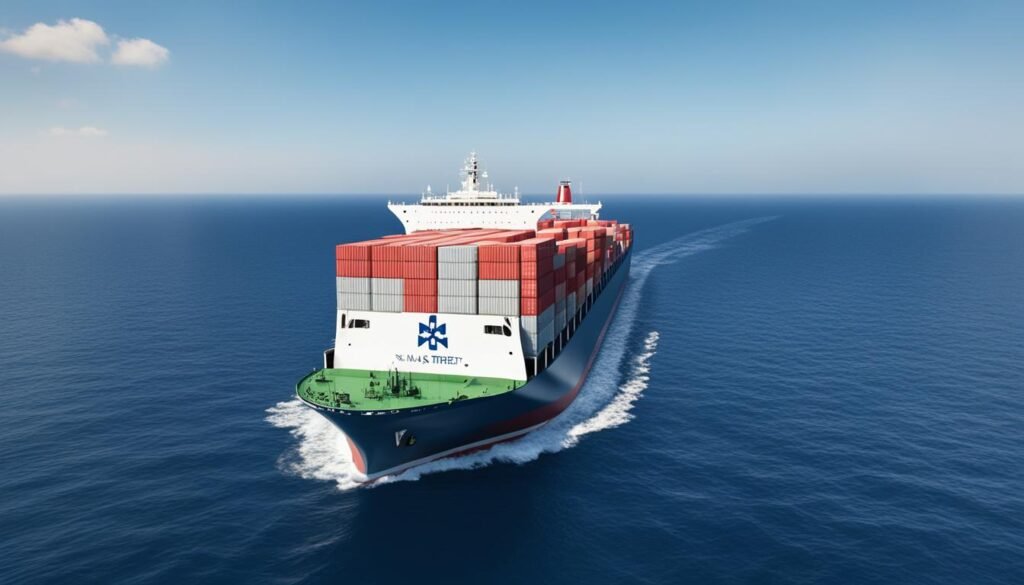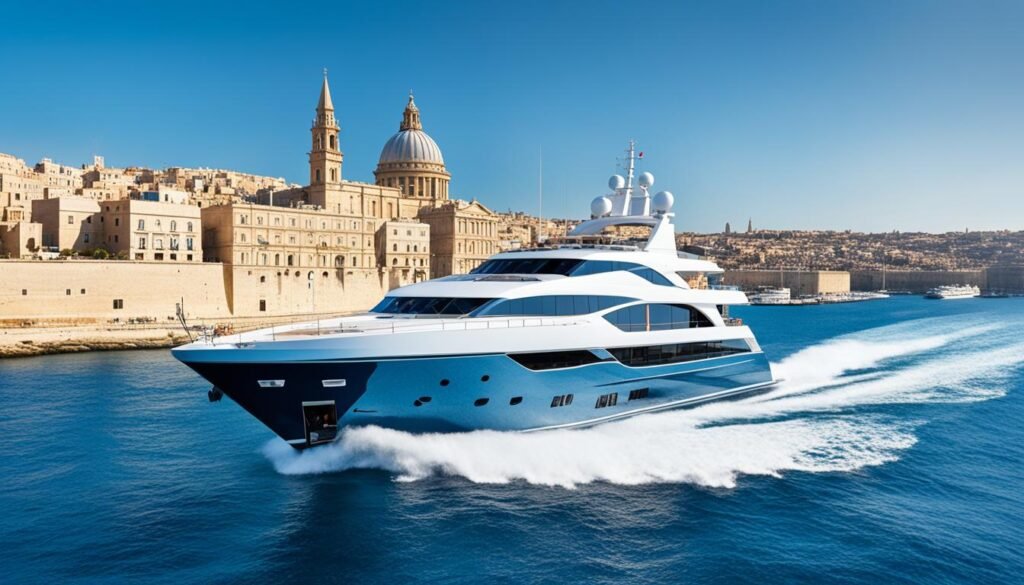Did you know that Malta is home to the 6th largest ship registry in the world and the largest in Europe? This strategic location in the heart of the Mediterranean has allowed the island nation to develop a comprehensive range of international maritime services. Malta’s rich maritime heritage and its membership in the European Union have positioned it as a premier destination for all matters of maritime law.
The Malta Ship Registry has experienced steady growth over the years, thanks to its efficient vessel registration process, low company formation costs, attractive fiscal incentives, and preferential treatment for Maltese ships in certain ports. This thriving maritime industry has also led to an ongoing process of privatization and development of various yacht marinas around Malta and Gozo, further solidifying the country’s reputation as a hub for maritime activities.
Key Takeaways
- Malta’s strategic location in the Mediterranean and its EU membership have made it a prime destination for international maritime services.
- The Malta Ship Registry is the 6th largest in the world and the largest in Europe, thanks to its efficient registration process and attractive fiscal incentives.
- Malta’s maritime industry has led to the development of numerous yacht marinas and a thriving maritime law practice.
- The country’s rich maritime heritage and expertise in all aspects of maritime law have made it a hub for international maritime activities.
- Malta’s regulatory framework and adherence to international maritime conventions have contributed to its success in the maritime sector.
Malta’s Strategic Maritime Position
Malta’s strategic position in the heart of the Mediterranean, just 93 km south of Sicily and 290 km north of Africa, has placed it at the forefront of maritime activity for centuries. The island’s location at the crossroads of Southern Europe, North Africa, and the Middle East has attracted the attention of major powers throughout history. This Mediterranean maritime hub has been a valuable asset for global international trade and the expansion of maritime empires.
Geographical Advantage
In the early 1500s, Malta was ruled by the Order of St. John, who enhanced the island’s maritime position through the construction of a shipyard facility. This strategic location allowed Malta to play a crucial role in the maritime operations of the British Empire in the Mediterranean. The island’s natural harbors and sheltered waters made it an ideal hub for maritime activities, from ship repair to cargo transshipment.
Historical Significance
In 1798, the French leader Napoleon Bonaparte recognized Malta’s maritime importance and seized control of the island, which was later taken over by the British for around 150 years. During this period, Malta’s maritime assets continued to be a valuable resource for the British Empire, solidifying its reputation as a strategic Mediterranean maritime hub.
The Maltese Flag and Ship Registry
The Maltese Flag has a distinguished history, tracing its roots back to 1973 when it was established as an Open Register of Shipping under the homeport of Valletta. Since then, the Malta Ship Registry has grown to become a renowned international ship registry, offering a comprehensive suite of maritime services. These include ship supplies, towage, bunkering, shipyards, shipbuilding and repair, as well as world-class facilities like the Freeport and yachting marinas.
Establishment and Growth
The Malta Maritime Authority, set up in 1991, was responsible for administering the Malta Registry of Shipping and Seamen. In 2010, the Malta Maritime Authority was incorporated into a wider organization, Transport Malta (TM), which assumed overall responsibility for maritime, land, and air transport. Since its inception, the Malta Flag has experienced significant and constant growth, becoming the largest in Europe and the sixth largest in the world in terms of tonnage. After joining the European Union in 2004, Malta has further strengthened its international status as a top-quality and reliable European flag.
Regulatory Authority
The Malta Maritime Authority and its successor, Transport Malta, have played a pivotal role in the development and regulation of the Malta Ship Registry. These organizations have been responsible for maintaining the highest standards of maritime safety and compliance, ensuring that the Maltese Flag remains a trusted and respected choice for ship owners and operators worldwide.

Malta’s Merchant Shipping Act
Malta’s Merchant Shipping Act, enacted in 1973, has played a pivotal role in shaping the country’s maritime legal landscape. Initially based on the UK Merchant Act, this legislative framework formally established the Malta Flag as an ‘open’ registry, catering to the evolving needs of the shipping industry.
The Malta Maritime Authority is responsible for administering and overseeing the Malta Flag. Over the years, the Merchant Shipping Act has been refined and expanded through amendments and supplementary legislation, ensuring it remains responsive to the dynamic nature of the maritime sector. This adaptability has been crucial in maintaining Malta’s position as a leading destination for vessel registration and maritime operations.
Legislative Framework
The Merchant Shipping Act serves as the foundation for Malta’s comprehensive legislative framework governing the shipping industry. This Act, along with its subsequent revisions and supplementary laws, provides a robust legal infrastructure that addresses a wide range of maritime-related issues, from vessel registration to crew regulations and maritime safety standards.
The evolving nature of the Merchant Shipping Act underscores Malta’s commitment to fostering a business-friendly environment for the shipping industry. By continuously refining the legislative framework, the country aims to maintain its competitive edge and attract a growing number of ship owners and operators to the Malta Flag.
Ship and Yacht Registration in Malta
Malta caters to the registration of a wide range of vessels, from pleasure yachts to commercial ships, including those under construction. The key requirement is that the vessel must be wholly owned by citizens of the European Union or by duly constituted corporate entities. When it comes to ship registration in Malta, there are no trading restrictions or age limitations, making it an attractive option for vessel owners.
However, ships older than fifteen years are subject to additional requirements and inspections before being accepted for Maltese registration. As a general rule, trading ships that are twenty-five years or older are typically not registered under the Maltese flag. This ensures the quality and safety standards of the Maltese ship registry are maintained, benefiting both vessel owners and the maritime industry as a whole.
Eligibility and Requirements
Malta’s ship and yacht registration process is designed to be straightforward and efficient. Vessel owners must provide proof of their EU citizenship or corporate entity status, as well as meet the necessary technical and safety requirements. The Maltese Merchant Shipping Act provides the legislative framework governing the registration process, ensuring compliance with international maritime regulations.
Age Restrictions
While Malta does not impose strict age restrictions on vessel registration, ships older than fifteen years may be subject to additional inspections and requirements. This helps maintain the high quality and safety standards of the Maltese ship registry, which is crucial for protecting the interests of vessel owners and the maritime industry as a whole.

Malta: Mediterranean Maritime Law Valletta Malta
Malta’s strategic location in the heart of the Mediterranean has solidified its position as a leading maritime hub. As the island nation’s capital, Valletta serves as the epicenter of Malta’s robust maritime law ecosystem. This vibrant legal landscape caters to the diverse needs of maritime professionals, from ship and yacht registration to specialized corporate structuring and tax planning.
The Maltese maritime legal framework is underpinned by a comprehensive legislative framework, including the Merchant Shipping Act, which provides a robust foundation for maritime operations. Alongside this, Malta’s ship and yacht registration processes offer a streamlined and efficient experience, attracting vessels from around the world to benefit from the island’s strategic advantages.
As a hub for maritime law in the Mediterranean, Malta continues to solidify its reputation as a premier destination for maritime professionals seeking expert legal guidance and a responsive regulatory environment. With its unique blend of geographical, historical, and legislative advantages, the island nation remains a prime choice for those navigating the complexities of maritime law.
Services Offered by Maritime Law Firms
Malta has established itself as a hub for maritime law and services, with leading firms like Chetcuti Cauchi offering a comprehensive suite of offerings. Their maritime team specializes in yacht registration, ship registration, corporate structuring, and tax planning – catering to the diverse needs of clients in the maritime industry.
Yacht Registration
Chetcuti Cauchi’s experts assist clients with all aspects of yacht registration, including eligibility assessments, documentation preparation, and liaising with the relevant authorities. Their knowledge of Malta’s regulatory framework ensures a seamless and efficient registration process for both new and existing yachts.
Ship Registration
In addition to yacht registration, the firm’s maritime law professionals also handle ship registration procedures. They provide guidance on the appropriate corporate structures, help with financing arrangements, and ensure compliance with Maltese and international maritime laws.
Corporate Structuring and Tax Planning
Recognizing the importance of strategic planning for maritime businesses, Chetcuti Cauchi offers comprehensive corporate structuring and tax planning solutions. Their team works closely with tax advisors and accountants to develop innovative structures that optimize efficiency and minimize tax liabilities for their clients’ maritime-related operations.

Maritime Law Practice Areas
Vassallo Associates, a respected Maltese law firm, has built a strong reputation in commercial and marine litigation, with a particular focus on various maritime law practice areas. Among the key areas of expertise are charter party disputes, cargo claims, and salvage and towage operations.
Charter Party Disputes
Charter party disputes involve disagreements between shipowners and charterers regarding the terms and conditions of charter party agreements. These complex contractual arrangements are critical in the maritime industry, and Vassallo’s maritime lawyers possess extensive experience in interpreting contract terms, assessing breaches, and seeking appropriate legal remedies on behalf of their clients.
Cargo Claims
Cargo claims arise when goods transported by sea are lost, damaged, or delayed during the shipping process. The firm’s maritime law practice handles these intricate cases, navigating the complexities of international maritime conventions and regulations to protect the rights and interests of cargo owners, freight forwarders, and other stakeholders.
Salvage and Towage
Salvage and towage operations are crucial in maritime emergencies, involving the rescue of ships, cargo, and crew from peril. Vassallo Associates’ maritime lawyers have deep expertise in this specialized field, providing legal guidance and representation to ensure the successful completion of these critical operations while safeguarding the rights and obligations of all parties involved.
Expertise in Maritime Litigation
Vassallo Associates’ maritime law practice covers a range of expertise in maritime litigation, including personal injury and death claims, heavy weather claims, and ship arrest and release. The firm’s lawyers are well-versed in navigating the complex legal landscape to protect the rights of clients involved in maritime disputes.
Personal Injury and Death Claims
When it comes to personal injury and death claims arising from incidents at sea or in navigable waters, the firm’s lawyers draw upon their deep understanding of applicable laws such as the Jones Act, the Longshore and Harbor Workers’ Compensation Act, and the Death on the High Seas Act. They work diligently to collect and present the necessary evidence, including witness testimonies and expert opinions, to ensure the successful resolution of these sensitive cases.
Heavy Weather Claims
Heavy weather claims, where damages are caused by severe weather conditions, require a meticulous approach. The firm’s lawyers are adept at collecting and analyzing meteorological data, ship logs, and expert testimony to substantiate the claims and secure favorable outcomes for their clients. Their attention to detail and ability to navigate the complexities of these cases make them a valuable asset in the maritime litigation field.
Ship Arrest and Release
Regarding ship arrest and release, Vassallo Associates’ lawyers are highly experienced in obtaining arrest orders, navigating the procedural requirements in various jurisdictions, and negotiating the release of vessels upon securing adequate security. Their expertise in this area ensures that clients’ interests are protected throughout the legal process.

Yachting Law and Compliance
Yachting law is a specialized field within maritime law, addressing the unique legal needs of the yachting community, including yacht owners, operators, builders, and crew. Vassallo Associates’ maritime law practice covers a wide range of yachting-related issues, from the construction and sale of yachts to operational disputes, crew employment matters, and compliance with safety and environmental regulations.
The firm’s lawyers draft and negotiate yacht purchase and sale agreements, handle registration and flagging issues, and resolve disputes related to yacht charters, maintenance, and refit contracts. They also advise on liability and insurance matters, addressing claims arising from accidents, damage, and personal injury. With a deep understanding of yachting law and regulations, Vassallo Associates helps clients navigate the complex legal landscape of yacht operations and ownership.
Beyond the legal aspects, the firm’s expertise extends to compliance with yacht regulations, ensuring clients adhere to safety standards, environmental protocols, and other industry-specific requirements. This comprehensive approach allows yacht owners and operators to focus on the enjoyment of the yachting lifestyle while Vassallo Associates handles the intricate legal and regulatory matters on their behalf.
Conclusion
Malta’s strategic location at the heart of the Mediterranean, combined with its rich maritime history and membership in the European Union, has positioned the island as a prominent maritime hub in the region. The establishment of the Malta Ship Registry, the largest in Europe and the sixth largest in the world, has been a significant contributor to the country’s reputation as a leading jurisdiction for maritime operations and dispute resolution in the Mediterranean.
Malta’s comprehensive maritime legal framework, along with the specialized services offered by its maritime law firms, have further solidified the island’s position as a premier destination for maritime activities. From yacht registration to ship registration and corporate structuring, Malta provides a wide range of maritime-related services that cater to the diverse needs of the industry.
As the Mediterranean continues to evolve as a crucial maritime region, Malta’s strategic location, robust legal system, and expertise in maritime law and compliance will undoubtedly play a crucial role in shaping the future of the industry in the region. Malta’s commitment to maintaining its standing as a Mediterranean maritime law hub is a testament to the country’s dedication to fostering a thriving and sustainable maritime sector.
Source Links
- Malta Shipping Law Firm | Chetcuti Cauchi Advocates Malta Law Firm – https://www.ccmalta.com/practices/maritime-law
- Maritime Lawyer Malta | Marine Law and Litigation Experts – https://www.hvassallo.com/practice-areas/marine-litigation/
- Maritime History of Malta – MMLA – https://mmla.org.mt/about-mmla/maritime-history-of-malta/


